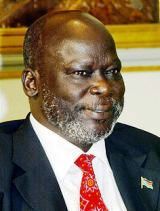Darfur rebels, Sudan govt meet next week – Ex- rebel leader
CAIRO, June 1, 2005 (AP)–Darfur rebels will meet with Sudan’s government in Abuja, Nigeria, next week to discuss a peace settlement in the conflict-ridden Darfur region, former rebel leader John Garang said Wednesday.
 Garang, leader of the Sudan People’s Liberation Movement, met with Egyptian President Hosni Mubarak in Cairo Wednesday and briefed him on the progress of talks between his group and the Sudanese government, especially the drafting of a new constitution.
Garang, leader of the Sudan People’s Liberation Movement, met with Egyptian President Hosni Mubarak in Cairo Wednesday and briefed him on the progress of talks between his group and the Sudanese government, especially the drafting of a new constitution.
Garang had met with rebel leaders in Oslo, Norway, in April, who told him they would approach the discussions with the government “without any preconditions … I believe they have already set June 10 as a date for the meeting,” he told reporters here.
The conflict in Darfur in western Sudan broke out in February 2003 after rebels took up arms, complaining of discrimination by Sudan’s Arab-dominated government. The government is accused of responding by backing a scorched-earth counterinsurgency by Arab militias, known as the Janjaweed.
War-induced hunger and disease has killed more than 180,000 people, according to U.N. estimates. About 2 million others have fled their homes.
The two main rebel groups in Darfur — the Sudan Liberation Movement and the Justice and Equality Movement — met in Tripoli, Libya, last month with local leaders from north, south and west Darfur regions and pledged to resume talks with the government.
The SPLM and the Sudanese government signed a peace deal in January and made Garang a first vice president, clearing the way for the drafting of a new constitution that would give southern states the opportunity to vote on secession in six years.
Garang said talks about the new constitution that began in April were “going well and we hope that we will finish it before middle of June and then be approved by parliament and the SPLM to pave the way for the formation of the national government by July 9.”
He said arguments over the Islamic wording at the top of the draft constitution were resolved by presenting two versions _ one for the north that kept the text and one for the south that would not carry the words “In the name of Allah the Merciful, the Compassionate,” an Islamic line that normally precedes most Islamic texts or statements and political declarations.
Sudan’s north is predominantly Islamic but those in the south are a mix of Christian, Muslim and animist beliefs.
Garang warned that the return of millions of refugees to their homes in southern Sudan following the war’s rend would create a humanitarian crisis worse than the tsunami that swept southeast Asia in December last year.
“We expect some 3 million people to return to southern Sudan from the north and another million from neighboring countries, that’s more than the Tsunami (crisis),” Garang said. “The U.N. food pipeline is virtually empty and people are actually starving to death in some places in southern Sudan. It is a horrific situation.”
